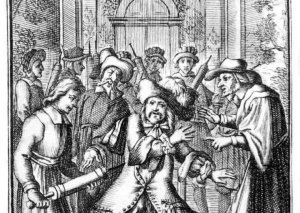Presented By: Medieval and Early Modern Studies (MEMS)
Late Moliere: An Early Modern Lyric Theater of the Absurd
Stephen Fleck, California State Long Beach

Molière’s critical reputation has centered on a near-exclusive appreciation for the literary qualities of the grandes comédies, to the detriment of his farces and his court-inspired spectacles, especially the new invention of comedy-ballets made with Lully and the choreographer/dancer Beauchamp. The move toward musical theater from 1669 until his death in early 1673 demonstrates that Molière was most interested in developing this area. Spectacle came to the fore as essential, not marginal, to dramatic effect. Virtuoso acting, a huge range of musical effects, unusual costuming, brilliant staging, along with several other innovations were vital to this endeavor, which constitutes a revolutionary form of dramaturgy, forgotten after Molière’s death. This lecture redresses the traditional focus on just one of the genres that Molière practiced. Video and musical clips will illustrate key points in the central argument: in the early modern period, Molière spearheaded the invention of a remarkably modern total-spectacle dramaturgy.